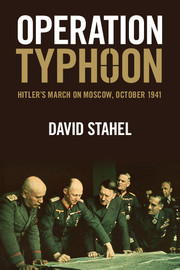Book contents
- Frontmatter
- Contents
- List of illustrations
- List of maps
- List of tables
- Acknowledgements
- Glossary
- Tables of military ranks and army structures
- Introduction
- 1 Contextualising Barbarossa
- 2 Operation Typhoon
- 3 Viaz'ma and Briansk
- 4 Carnage on the road to Moscow
- 5 Bock's final triumph
- 6 Exploiting the breach
- 7 Weathering the storm
- 8 Running on empty
- 9 The eye of the storm
- Conclusion
- Notes
- Bibliography
- Index
5 - Bock's final triumph
Published online by Cambridge University Press: 05 March 2013
- Frontmatter
- Contents
- List of illustrations
- List of maps
- List of tables
- Acknowledgements
- Glossary
- Tables of military ranks and army structures
- Introduction
- 1 Contextualising Barbarossa
- 2 Operation Typhoon
- 3 Viaz'ma and Briansk
- 4 Carnage on the road to Moscow
- 5 Bock's final triumph
- 6 Exploiting the breach
- 7 Weathering the storm
- 8 Running on empty
- 9 The eye of the storm
- Conclusion
- Notes
- Bibliography
- Index
Summary
‘We shall all die out here’ – the battle of Viaz'ma
On 3 November 1812 Viaz'ma gave its name to another battle against another would-be conqueror of Russia, Napoleon Bonaparte. On that occasion it was the Russian forces that were attempting to cut off a part of the French army as it retreated towards Smolensk. The attempt was unsuccessful, but the Russians liberated Viaz'ma in the process and, for the first time in the war, the battle resulted in much heavier losses for the French. Viaz'ma was therefore a historic signpost, known to Russians as one of the hallowed battlegrounds on which the country's freedom from foreign rule was won. The disaster unfolding at Viaz'ma 129 years later could not have offered a starker contrast and has been accepted as nothing short of a calamity for the Soviet Union. Yet that view was later contested by Zhukov in his post-war memoir. While the collapse of the Soviet front and subsequent encirclement represented an undeniable failure of the Soviet command, the refusal of the trapped armies to capitulate, even in the face of overwhelming odds, played an important role in stemming Hitler's drive on Moscow. As Zhukov explained:
Thanks to the persistence and staunchness of our troops who fought in the encirclement near Viaz'ma, we had gained time invaluable for strengthening the Mozhaisk defence line. And so it was not in vain that the surrounded troops laid down their lives and shed their blood. Their heroic deeds, their enormous contribution to the defence of Moscow, still remains to be put into writing.
Indeed the fanatical Soviet resistance within the Viaz'ma pocket did more than just buy Zhukov time. Although any comparative German/Soviet loss ratio reflects a hopeless imbalance in favour of Bock's forces, the fact remains that German losses were heaviest among Hoepner's panzer divisions, cutting their operational strength for the later offensive towards Moscow.
- Type
- Chapter
- Information
- Operation TyphoonHitler's March on Moscow, October 1941, pp. 142 - 172Publisher: Cambridge University PressPrint publication year: 2013



